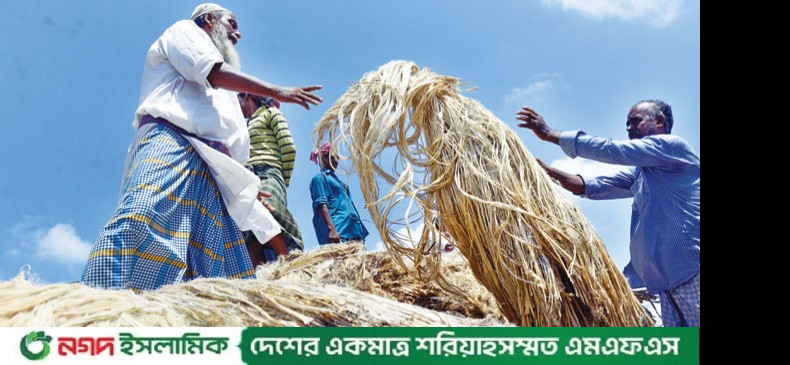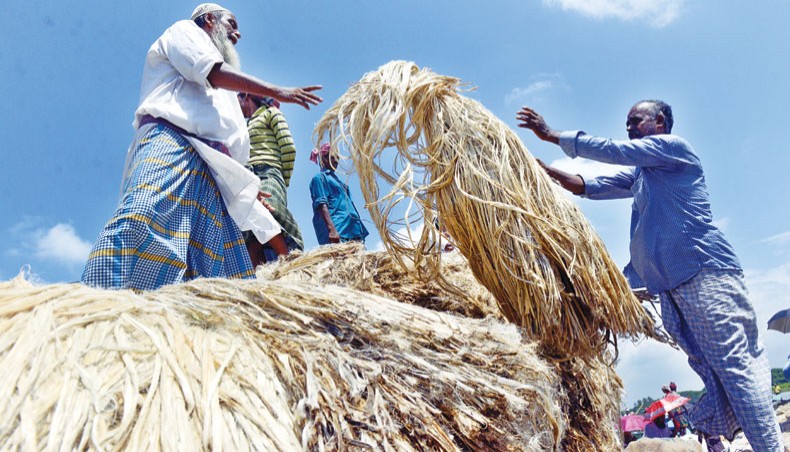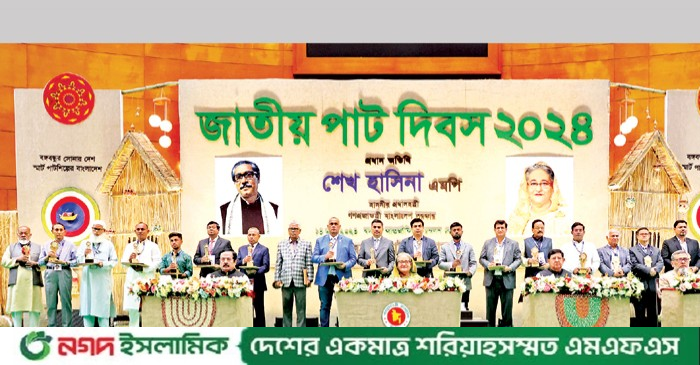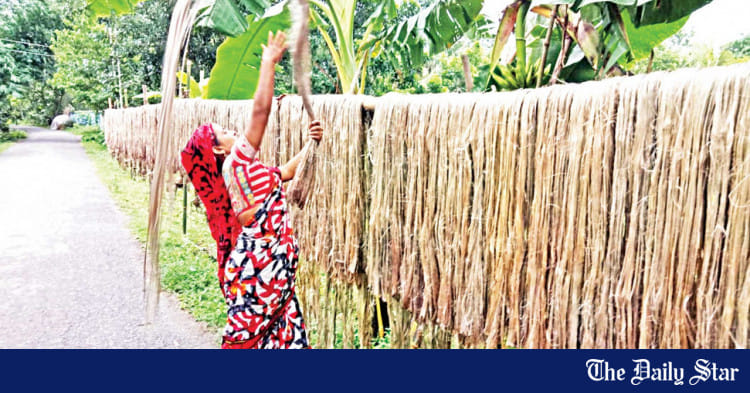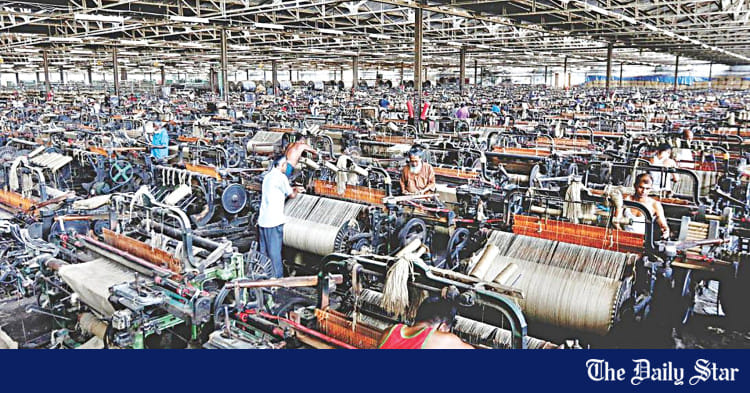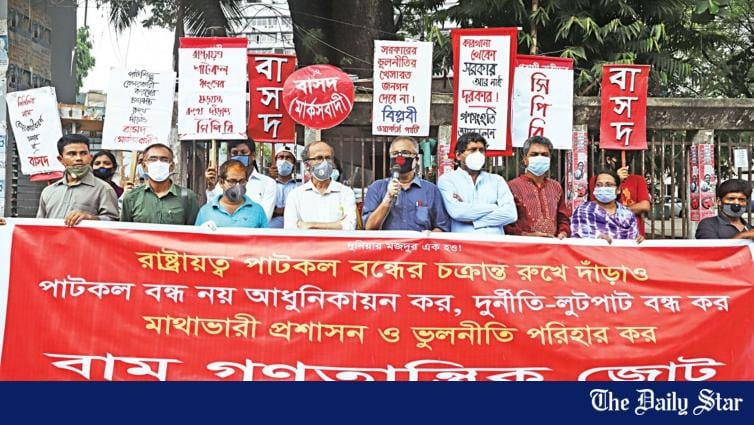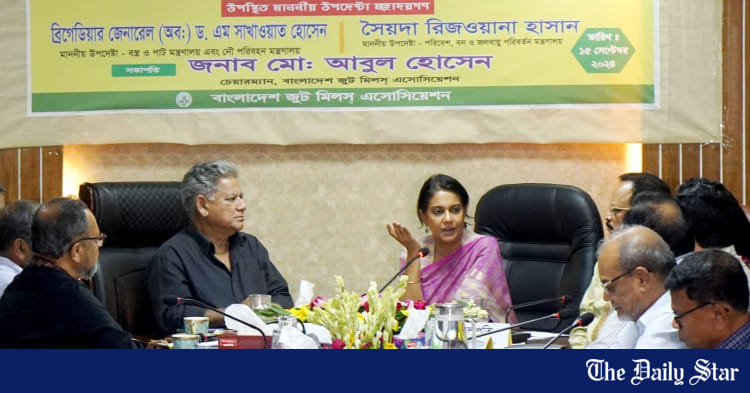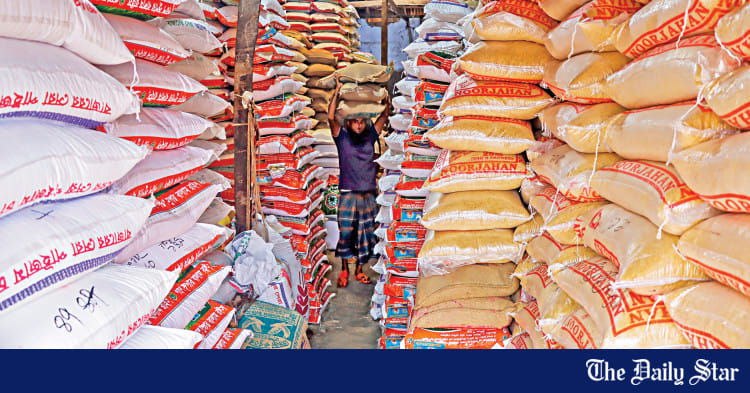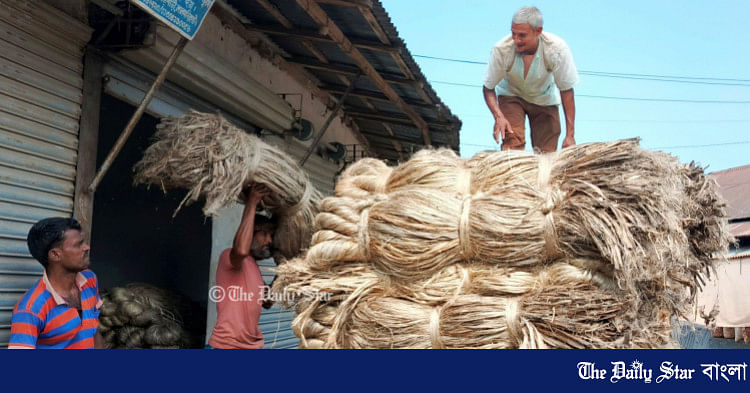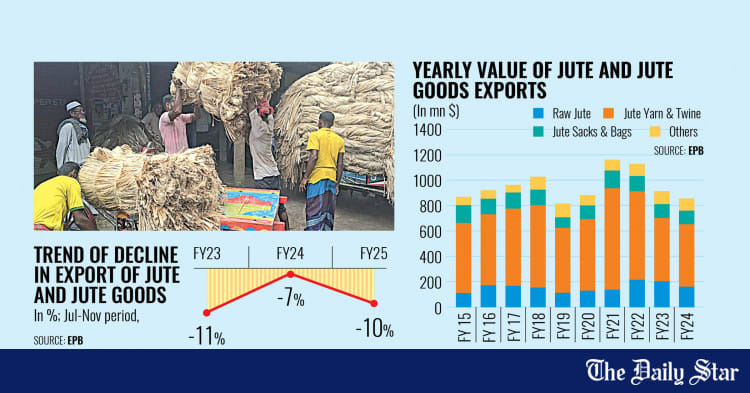Saif
Senior Member
- 13,746
- 7,411
- Origin

- Axis Group

Introduction
Jute is a natural fibre popularly known as the golden fibre. It is one of the cheapest and the strongest of all natural fibers and considered as fibre of the future. Jute is second only to cotton in world's production of textile fibers. India, Bangladesh, China and Thailand are the leading producers of Jute. It is also produced in southwest Asia and Brazil. The jute fibre is also known as Pat, kosta, Nalita, Bimli or Mesta (kenaf).
Jute, as a natural fibre, has many inherent advantages like lustier, high tensile strength, low extensibility, moderate heat and fire resistance and long staple lengths. It is a biodegradable and eco-friendly. It has many advantages over synthetics and protects the environment and maintains the ecological balance.
Jute is not only a major textile fibre but also a raw material for nontraditional and value added non-textile products. Jute is used extensively in the manufacture of different types of traditional packaging fabrics, manufacturing Hessian, sacking, carpet backing, mats, bags, tarpaulins, ropes and twines.
Recently jute fibers are used in a wide range of diversified products: decorative fabrics, chic-saris, salwar kamizes, soft luggage's, footwear, greeting cards, molded door panels and other innumerable useful consumer products. Supported by several technological developments today jute can be used to replace expensive fibers and scare forest materials.
Background of Jute Industry
Jute Industry played an important role in the economic development of Bengal. At the beginning of the twentieth century, Bengal could boast of only one manufacturing industry - jute. It employed about a half of the total industrial workforce of Bengal. In 1900-1, the export value of jute manufactures accounted for nearly a third of the entire export trade of Bengal.
The industry was dominated at the beginning, by Europeans and later, by Marwari. During most of its history, three-quarters of the labourers in jute factories were non-Bengalis. Bengalis generally occupied only the intermediate position in the industry. The raw jute for the industry used to come from Eastern Bengal.
Prior to the establishment of the first jute mill in 1855, handloom weavers used jute fiber to make twines, ropes, coarse fabrics for the poor, and also for fishing and for mooring vessels. Towards the end of the eighteenth century, jute attracted the attention of the British east india company, which sent a consignment of jute samples to England in 1791 that were successfully spun by flax machinery.
The British also found out means to soften the hard and brittle nature of jute fiber by adding oil and water. This made the fiber more pliable and easily separable, and resulted in the production of a usable thread.
Several historical events were responsible for the growth of the jute industry. In 1838, the Dutch government specified bags made of jute instead of flax for carrying coffee from the East Indies. At that time flax was imported from Russia. However, the Crimean War of 1854-56 led to the stoppage of supply of flax from Russia and forced Dundee, the famous jute-manufacturing centre of UK, to look for substitutes. In Dundee, the flax mills were converted into jute mills.
The American Civil War (1861-65), on the other hand, gave further impetus to the jute trade, as supplies of American cotton were much restricted. Since then, the industry did not return to flax or cotton. The main reason for this permanent shift had been its comparative cost advantage.
The jute industry grew rapidly and jute mills were established in many countries, including USA, Germany, France, Belgium, Austria, Italy, Holland, Spain, Russia, Brazil and Bengal. This led to a rapid increase in the demand for jute. The Bengali peasants responded quickly to meet the world demand by increasing the area under jute cultivation.
The outbreak of the First World War led to a rapid increase in the demand for raw jute, since it was used to manufacture sandbags to protect soldiers in trenches and to produce gunny bags for carrying food grain for the army. Inevitably, the price of jute also rose sharply.
Although Bengal, particularly Eastern Bengal, was the main producer of quality raw jute, the first jute mill was established at Risraw near Calcutta on the bank of the Hugli only in 1855, after 20 years of mechanical spinning of jute in Dundee. The delay was due to the non-availability of technical hands and power to drive machines. In 1854, coalmines were opened at Raniganj.
Attracted by the easy availability of power, George Auckland, an Englishman established the first jute mill. But he could not make reasonable profits and left the business. In 1859, the Bornee Company founded the second mill with spinning and weaving facilities. Unlike the Aucland mill, it started prospering after its establishment. Within five years it doubled its plant size.
By 1866, three new mills were established. Between 1868 and 1873, these mills made large profits. Five new companies started in 1874 and 8 more in 1875. Thus, Bengal experienced a real boom in jute industry towards the end of the nineteenth century.
With the establishment of jute mills, Bengal became a major exporter of sacking bags. Calcutta appeared to be a strong competitor of Dundee and successfully penetrated into Dundee's hessian market in many parts of the world, including America, primarily because Calcutta had the cost advantage in producing jute goods.
Secondly, it was situated in close proximity to the jute growing districts of Eastern Bengal and Assam. Thirdly, it had cheap labour. Fourthly, the mills ran for 15 to 16 hours, and sometimes even for 22 hours daily. This led to a clear advantage of Calcutta manufacturers in monetary terms.
Moreover, they could offer a finer quality of jute. In sixty years between 1880 and 1940, the number of mills increased by 5 times, that of looms by about 14 times, of spindles by 19 times, and of persons employed by 11 times (see Table). The growth of the industry was significant during the 20 years between 1900 and 1920. During the Great Depression of 1929-33, the jute industry was severely hit since the demand for jute goods declined drastically throughout the world.
Table: Growth of jute industry in Bengal, 1879-1939
Before it was put to industrial use, jute was used mostly for domestic purposes. With the conversion of the Dundee flax mills into jute processing mills, the demand for jute increased manifold in the world. Bengali peasants were highly experienced in jute cultivation and could respond quickly to meeting this increased demand.
In 1872, when industrial use of jute had begun, it was mainly grown in the districts of pabna, bogra, darjeeling,dinajpur, rangpur and Hughli (West Bengal). The ratio of land under jute cultivation to total cropped land in these districts in 1872 was 14%, 11%, 9%, 7%, 6% and 5% respectively. Subsequently, jute cultivation spread to other districts. In 1914, leading districts in terms of the above ratio were Rangpur (28 %,) Bogra (25%), Tippera (comilla, 24%), Pabna (21%), Dhaka (18%), Faridpur (16%), Hughli (West Bengal, 13%), Rajshahi (11%), Jessore (10%), Nadia (10%), and Dinajpur (7%).
After the end of the First World War in 1918, the world demand for raw jute decreased. This had a negative impact on the area under jute cultivation. The situation worsened for jute cultivation during the Great Depression of 1929-33. The prices sank so low that jute growing became unprofitable. As a result, peasants greatly reduced their area under jute cultivation. By 1939, economic recovery took place. The breaking out of the Second World War caused an increase in the demand for jute and between 1939 and 1945; peasants put more areas under jute cultivation.
After the Partition of Bengal in 1947, it was found that all jute mills of the region were in West Bengal, which became a part of India and all major jute growing districts became part of East Bengal, a province of Pakistan. As it had no jute mills, East Bengal faced problems in marketing of raw jute. The problem was, however, quickly overcome by establishing jute mills in East Bengal.
The jute industry in the public sector, by virtue of its location in East Pakistan, became the property of Bangladesh after independence in 1971. Pakistani mill owners (about 68% of the total loom strength) left the country, leaving the industry in disarray. Abandoned jute mills were subject to heavy looting. The new government of Bangladesh had to take up the responsibility of rebuilding the industry. By a Presidential order, about 85% of industries, including all jute mills, were nationalized.
Bangladesh Jute Mills Corporation (BJMC) was formed to manage and look after all the 73 jute mills having 23,836 looms at that time. At one stage the number of jute mills under the jurisdiction of BJMC went up to 78. BJMC had to revive the industry from a ruined position. Immediately after liberation, it became very difficult to solve problem of financial hardship of the jute industry because financial institutions were not working well. The short supply of spares, labour unrest, wastage in production etc. shook the industry severely.
For jute industry of Bangladesh, the first two years after liberation was the period of reorganization. The government offered cash subsidy to the industry, which amounted to Tk 200 million annually. The annual cash subsidy was reduced to 100 million since 1976-77. Thanks to this policy and periodic devaluation of currency, Bangladesh could retain its position of a prime exporter of jute goods in the dollar areas of export. The industry earned profit in 1979-80, when the subsidy was withdrawn.
By December 1979, BJMC had 77 jute mills, two carpet backing mills, and two spare parts producing units. In 1980, six twine mills were disinvested to the private sector. In June 1981, BJMC had 74 mills under its administration. These mills had about 165,000 workers and 27,000 managerial and office staff.
Denationalization of jute mills started in July 1982. The government ordered BJMC to complete the process by 16 December 1982, but only 10 mills could be handed over to Bangladeshi owners by that time. The valuation process and settlement of other organizational matters relating to handing over of the mills took a long time. Among the jute mills owned by BJMC, 46 had satisfactory financial performance in 1982-83, when their profit before contribution to national exchequer was about Tk 240 million.
The same mills incurred total losses of about Tk 430 million in the previous year. Jute mills incurred losses regularly over years and external donor agencies pressed hard for denationalization. More and more mills were put into the denationalization list. In 1999, BJMC had 33 mills. The World Bank continued to work closely with the government to restructure the jute sector, especially through denationalization, merger, dissolution, closure and setting up of new units.
The importance of the jute sector to the Bangladesh economy, in particular, cannot be over-stated, it is a major cash crop for over three million small farm households, the largest industry, producing about one-third of manufacturing output, and the largest agricultural export commodity in Bangladesh. The livelihood of about 25 million people (almost one - fifth of the total population) is dependent on jute - related activities in agriculture, domestic marketing, manufacturing and trade.
Jute, as a renewable natural fiber, is also bio- degradable and environmentally friendly, it is one of the few crops, which can be grown in the monsoon season, and can be rotated with rice to restore the soil fertility and structure. The leaves of jute plants enrich the fertility of the soil for sustained agriculture, and have good nutrition value as vegetables. Use of jute sticks as fuel and fencing material as substitute for wood prevents deforestation. Therefore, the increased global concern for the environment, the future prospects for jute remains high.
Lest we forget, the jute industry was the life blood of our economy for several decades and continues to be one of the mainstays of our rural economy even today. About 15 million farmers are involved in growing this cash crop and several million more of our population, perhaps an equal number, are involved with its processing, transportation, conversion, etc. In order to understand the current state of affairs in the industry, one must look into the background of the jute industry and the events that took place over the last several decades.
Bangladesh Jute at a Glance
Acronyms used
The Basic Jute Products
The most basic and essential jute commodities fabricated in Bangladesh jute mills are:
Jute is a natural fibre popularly known as the golden fibre. It is one of the cheapest and the strongest of all natural fibers and considered as fibre of the future. Jute is second only to cotton in world's production of textile fibers. India, Bangladesh, China and Thailand are the leading producers of Jute. It is also produced in southwest Asia and Brazil. The jute fibre is also known as Pat, kosta, Nalita, Bimli or Mesta (kenaf).
Jute, as a natural fibre, has many inherent advantages like lustier, high tensile strength, low extensibility, moderate heat and fire resistance and long staple lengths. It is a biodegradable and eco-friendly. It has many advantages over synthetics and protects the environment and maintains the ecological balance.
Jute is not only a major textile fibre but also a raw material for nontraditional and value added non-textile products. Jute is used extensively in the manufacture of different types of traditional packaging fabrics, manufacturing Hessian, sacking, carpet backing, mats, bags, tarpaulins, ropes and twines.
Recently jute fibers are used in a wide range of diversified products: decorative fabrics, chic-saris, salwar kamizes, soft luggage's, footwear, greeting cards, molded door panels and other innumerable useful consumer products. Supported by several technological developments today jute can be used to replace expensive fibers and scare forest materials.
Background of Jute Industry
Jute Industry played an important role in the economic development of Bengal. At the beginning of the twentieth century, Bengal could boast of only one manufacturing industry - jute. It employed about a half of the total industrial workforce of Bengal. In 1900-1, the export value of jute manufactures accounted for nearly a third of the entire export trade of Bengal.
The industry was dominated at the beginning, by Europeans and later, by Marwari. During most of its history, three-quarters of the labourers in jute factories were non-Bengalis. Bengalis generally occupied only the intermediate position in the industry. The raw jute for the industry used to come from Eastern Bengal.
Prior to the establishment of the first jute mill in 1855, handloom weavers used jute fiber to make twines, ropes, coarse fabrics for the poor, and also for fishing and for mooring vessels. Towards the end of the eighteenth century, jute attracted the attention of the British east india company, which sent a consignment of jute samples to England in 1791 that were successfully spun by flax machinery.
The British also found out means to soften the hard and brittle nature of jute fiber by adding oil and water. This made the fiber more pliable and easily separable, and resulted in the production of a usable thread.
Several historical events were responsible for the growth of the jute industry. In 1838, the Dutch government specified bags made of jute instead of flax for carrying coffee from the East Indies. At that time flax was imported from Russia. However, the Crimean War of 1854-56 led to the stoppage of supply of flax from Russia and forced Dundee, the famous jute-manufacturing centre of UK, to look for substitutes. In Dundee, the flax mills were converted into jute mills.
The American Civil War (1861-65), on the other hand, gave further impetus to the jute trade, as supplies of American cotton were much restricted. Since then, the industry did not return to flax or cotton. The main reason for this permanent shift had been its comparative cost advantage.
The jute industry grew rapidly and jute mills were established in many countries, including USA, Germany, France, Belgium, Austria, Italy, Holland, Spain, Russia, Brazil and Bengal. This led to a rapid increase in the demand for jute. The Bengali peasants responded quickly to meet the world demand by increasing the area under jute cultivation.
The outbreak of the First World War led to a rapid increase in the demand for raw jute, since it was used to manufacture sandbags to protect soldiers in trenches and to produce gunny bags for carrying food grain for the army. Inevitably, the price of jute also rose sharply.
Although Bengal, particularly Eastern Bengal, was the main producer of quality raw jute, the first jute mill was established at Risraw near Calcutta on the bank of the Hugli only in 1855, after 20 years of mechanical spinning of jute in Dundee. The delay was due to the non-availability of technical hands and power to drive machines. In 1854, coalmines were opened at Raniganj.
Attracted by the easy availability of power, George Auckland, an Englishman established the first jute mill. But he could not make reasonable profits and left the business. In 1859, the Bornee Company founded the second mill with spinning and weaving facilities. Unlike the Aucland mill, it started prospering after its establishment. Within five years it doubled its plant size.
By 1866, three new mills were established. Between 1868 and 1873, these mills made large profits. Five new companies started in 1874 and 8 more in 1875. Thus, Bengal experienced a real boom in jute industry towards the end of the nineteenth century.
With the establishment of jute mills, Bengal became a major exporter of sacking bags. Calcutta appeared to be a strong competitor of Dundee and successfully penetrated into Dundee's hessian market in many parts of the world, including America, primarily because Calcutta had the cost advantage in producing jute goods.
Secondly, it was situated in close proximity to the jute growing districts of Eastern Bengal and Assam. Thirdly, it had cheap labour. Fourthly, the mills ran for 15 to 16 hours, and sometimes even for 22 hours daily. This led to a clear advantage of Calcutta manufacturers in monetary terms.
Moreover, they could offer a finer quality of jute. In sixty years between 1880 and 1940, the number of mills increased by 5 times, that of looms by about 14 times, of spindles by 19 times, and of persons employed by 11 times (see Table). The growth of the industry was significant during the 20 years between 1900 and 1920. During the Great Depression of 1929-33, the jute industry was severely hit since the demand for jute goods declined drastically throughout the world.
Table: Growth of jute industry in Bengal, 1879-1939
| Year | Mills | Looms | Spindles | Employment |
| 1879-80 | 22 | 5,000 | 71,000 | 27,000 |
| 1900-01 | 36 | 16,100 | 331,400 | 114,800 |
| 1920-21 | 77 | 41,600 | 869,900 | 288,400 |
| 1938-39 | 110 | 69,000 | 13,70,000 | 299,000 |
Before it was put to industrial use, jute was used mostly for domestic purposes. With the conversion of the Dundee flax mills into jute processing mills, the demand for jute increased manifold in the world. Bengali peasants were highly experienced in jute cultivation and could respond quickly to meeting this increased demand.
In 1872, when industrial use of jute had begun, it was mainly grown in the districts of pabna, bogra, darjeeling,dinajpur, rangpur and Hughli (West Bengal). The ratio of land under jute cultivation to total cropped land in these districts in 1872 was 14%, 11%, 9%, 7%, 6% and 5% respectively. Subsequently, jute cultivation spread to other districts. In 1914, leading districts in terms of the above ratio were Rangpur (28 %,) Bogra (25%), Tippera (comilla, 24%), Pabna (21%), Dhaka (18%), Faridpur (16%), Hughli (West Bengal, 13%), Rajshahi (11%), Jessore (10%), Nadia (10%), and Dinajpur (7%).
After the end of the First World War in 1918, the world demand for raw jute decreased. This had a negative impact on the area under jute cultivation. The situation worsened for jute cultivation during the Great Depression of 1929-33. The prices sank so low that jute growing became unprofitable. As a result, peasants greatly reduced their area under jute cultivation. By 1939, economic recovery took place. The breaking out of the Second World War caused an increase in the demand for jute and between 1939 and 1945; peasants put more areas under jute cultivation.
After the Partition of Bengal in 1947, it was found that all jute mills of the region were in West Bengal, which became a part of India and all major jute growing districts became part of East Bengal, a province of Pakistan. As it had no jute mills, East Bengal faced problems in marketing of raw jute. The problem was, however, quickly overcome by establishing jute mills in East Bengal.
The jute industry in the public sector, by virtue of its location in East Pakistan, became the property of Bangladesh after independence in 1971. Pakistani mill owners (about 68% of the total loom strength) left the country, leaving the industry in disarray. Abandoned jute mills were subject to heavy looting. The new government of Bangladesh had to take up the responsibility of rebuilding the industry. By a Presidential order, about 85% of industries, including all jute mills, were nationalized.
Bangladesh Jute Mills Corporation (BJMC) was formed to manage and look after all the 73 jute mills having 23,836 looms at that time. At one stage the number of jute mills under the jurisdiction of BJMC went up to 78. BJMC had to revive the industry from a ruined position. Immediately after liberation, it became very difficult to solve problem of financial hardship of the jute industry because financial institutions were not working well. The short supply of spares, labour unrest, wastage in production etc. shook the industry severely.
For jute industry of Bangladesh, the first two years after liberation was the period of reorganization. The government offered cash subsidy to the industry, which amounted to Tk 200 million annually. The annual cash subsidy was reduced to 100 million since 1976-77. Thanks to this policy and periodic devaluation of currency, Bangladesh could retain its position of a prime exporter of jute goods in the dollar areas of export. The industry earned profit in 1979-80, when the subsidy was withdrawn.
By December 1979, BJMC had 77 jute mills, two carpet backing mills, and two spare parts producing units. In 1980, six twine mills were disinvested to the private sector. In June 1981, BJMC had 74 mills under its administration. These mills had about 165,000 workers and 27,000 managerial and office staff.
Denationalization of jute mills started in July 1982. The government ordered BJMC to complete the process by 16 December 1982, but only 10 mills could be handed over to Bangladeshi owners by that time. The valuation process and settlement of other organizational matters relating to handing over of the mills took a long time. Among the jute mills owned by BJMC, 46 had satisfactory financial performance in 1982-83, when their profit before contribution to national exchequer was about Tk 240 million.
The same mills incurred total losses of about Tk 430 million in the previous year. Jute mills incurred losses regularly over years and external donor agencies pressed hard for denationalization. More and more mills were put into the denationalization list. In 1999, BJMC had 33 mills. The World Bank continued to work closely with the government to restructure the jute sector, especially through denationalization, merger, dissolution, closure and setting up of new units.
The importance of the jute sector to the Bangladesh economy, in particular, cannot be over-stated, it is a major cash crop for over three million small farm households, the largest industry, producing about one-third of manufacturing output, and the largest agricultural export commodity in Bangladesh. The livelihood of about 25 million people (almost one - fifth of the total population) is dependent on jute - related activities in agriculture, domestic marketing, manufacturing and trade.
Jute, as a renewable natural fiber, is also bio- degradable and environmentally friendly, it is one of the few crops, which can be grown in the monsoon season, and can be rotated with rice to restore the soil fertility and structure. The leaves of jute plants enrich the fertility of the soil for sustained agriculture, and have good nutrition value as vegetables. Use of jute sticks as fuel and fencing material as substitute for wood prevents deforestation. Therefore, the increased global concern for the environment, the future prospects for jute remains high.
Lest we forget, the jute industry was the life blood of our economy for several decades and continues to be one of the mainstays of our rural economy even today. About 15 million farmers are involved in growing this cash crop and several million more of our population, perhaps an equal number, are involved with its processing, transportation, conversion, etc. In order to understand the current state of affairs in the industry, one must look into the background of the jute industry and the events that took place over the last several decades.
Bangladesh Jute at a Glance
| 1. | Average land area under jute cultivation | : | 12.35 Lac acres | |||||||||||||||||||||||||||||||
| 2. | Average production of jute carryover | : |
| |||||||||||||||||||||||||||||||
| 3. | Average internal consumption of jute | : | 38 Lac bales (0.68 Million Ton) | |||||||||||||||||||||||||||||||
| 4. | Average Export of raw jute with value |
| ||||||||||||||||||||||||||||||||
| 5. | Number of jute Mills: | : | Under BJSA 81 Under BJMA 97 Under BJMC 27 TOTAL : 205 UNITS | |||||||||||||||||||||||||||||||
| 6. | Number of workers employed in Jute Mills (Approx.) | : | BJSA Mills 55,868 BJMA Mills 39,000 BJMC Mills 61,681 TOTAL: 1,56,549 | |||||||||||||||||||||||||||||||
| 7. | Average production of Jute goods | : | BJSA Mills 3,60,500 M. Tons BJMA Mills 1,56,500 M. Tons BJMC Mills 1,46,000 M. Tons TOTAL : 6,63,000 M. TONS | |||||||||||||||||||||||||||||||
| 8. | Average internal consumption of Jute goods | : | BJSA Mills 20,000 M. Tons (yarn/twine) BJMA Mills 48,000 M. Tons (sacking/hessain) BJMC Mills 21,000 M. Tons (sacking/hessain) TOTAL : 89,000 M. TONS | |||||||||||||||||||||||||||||||
| 9. | Average Export of jute goods with quantity, value | : |
BJMA Mills 97,160 58 BJMC Mills 96,523 537 TOTAL : 5,35,878 3139 | |||||||||||||||||||||||||||||||
| 10. | Spindles in Jute Spinning Mills | : | 1,75,114 Installed 1,47,124 Operated | |||||||||||||||||||||||||||||||
| 11. | Installed Looms in Jute
| : |
|
Acronyms used
- BJSA Bangladesh Jute Spinners Association (Private Sector)
BJMA Bangladesh Jute Mills Association (Private Sector)
BJMC Bangladesh Jute Mills Corporation (Public Sector)
CBC Carpet Backing Cloth.
|
The Basic Jute Products
The most basic and essential jute commodities fabricated in Bangladesh jute mills are:
- Canvas: It is the finest jute item, woven with highly premium grades of fiber. Jute canvas and screen lamination along with paper polythene is widely used in mines and for getting protection against weather.
- Sacking Cloth: Made up of low quality jute fibers, sacking cloth is loosely woven heavy cloth used for packing sugar, food grains, cement etc. Weighing from 15 to 20 ozs, several qualities are available in this category like Twill, heavy Cees, D.W Flour, Cement Bags and many more.
- Hessian Cloth: It is a plain woven superior quality jute fabric, weighing between 5 and 12 ozs, a yard. Hessian cloth is highly exported all across the world in the form of cloth, bags etc. Also known as burlap, this cloth is vastly used in wide ambit of applications.
- D.W. Tarpaulin: This product is majorly used for coverings on a very high multidimensional scale.
- Bags: Used mainly for shopping, bags are usually fabricated from sacking or hessian cloths. They are often decorated with varied artistic designs and with straps, chains and handles in several dimensions and shapes. Other categories of bags are promotional bags which are manufactured to promote items for sale.
- Hydrocarbon free jute cloth: This cloth is fabricated by treating jute with vegetable oil. It is a hessian fabric, hydrocarbon free cloth, widely used for packing different food materials, cocoa, coffee, peanut beans etc.
- Geo-textile: It is a jute cloth laid along the river embankment sides and hill slopes to prevent soil erosion and landslides.
- Serim Cloth: It is a light weight hessian cloth, used in felt industry for reinforcing the non woven fabric and for strengthening paper with lamination.
- Tobacco sheets: Used for wrapping tobacco leaves, tobacco sheets are made up of hessian cloth.
- Decorative items: The vast variety of decorative products are made up of jute fabrics like wall hangings, toys, table lamps, paper, decorative bags, furniture and many more.
- Hessian tapes and gaps: They are made up with hessian cloth, woven with gaps at regular intervals and the cloths cut between the gaps to make small width taps.



